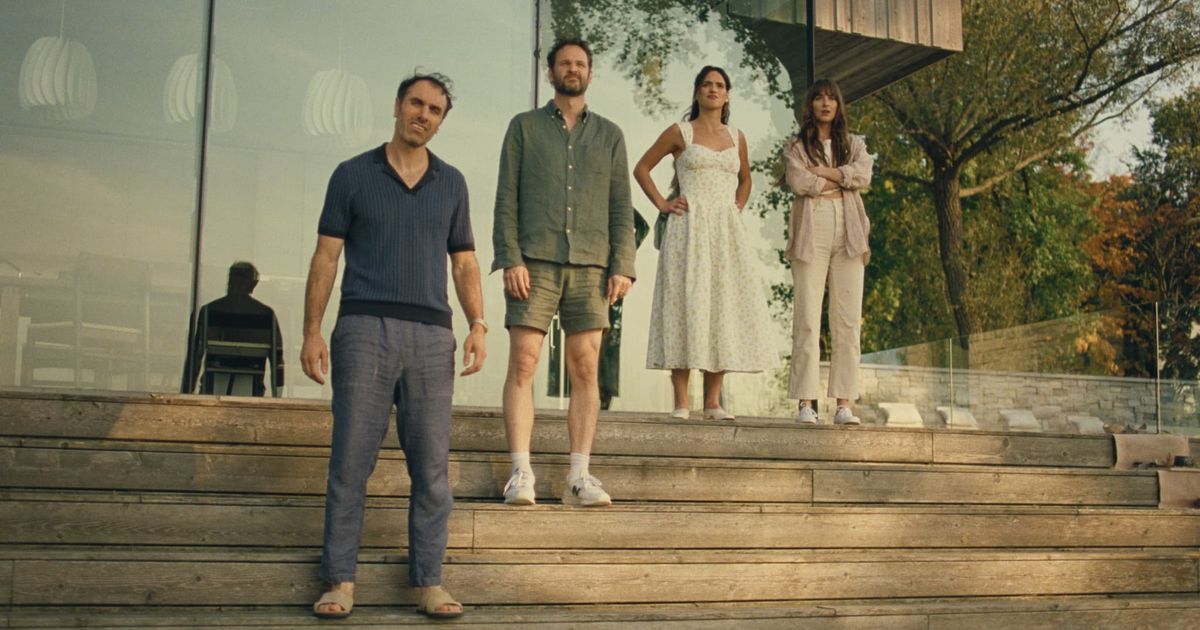If you have spent any time on a dating app in hetero-world, you’ve probably encountered the type: enthusiastic, communicative, “partnered” with someone but “open” and very eager to talk about it. Or, rather, explain it – how it works, what the rules are, why it’s right for them. There is, of course, nothing inherently wrong with ethical non-monogamy – actually, there can be a lot right – nor should there be any universal expectations of romantic relationships besides mutual respect. But the reputation of ENMs in the straight dating world, however rightly earned, is suspect: expected condescension, mutually projected emotional superiority. Perhaps right in principle but also often annoying, and thus ripe for comedic skewering.
Enter Splitsville, a new so-called “unromantic comedy” from longtime friends and writing partners Kyle Marvin and Michael Angelo Covino about a foursome of friends imperiled by loose boundaries. Owing to the protracted timeline and gargantuan feat of simply making a movie, the 104-minute film arrives a few years after buzz around open relationships percolated again, at least in New York, the city around which these four characters spiritually orbit. One might worry that Splitsville, directed by Covino, might feel a little passé, though that’s dispelled when the hapless Carey (Marvin) reveals that he and his life coach / wife Ashley (a ridiculously luminous Adria Arjona) met at a concert for The Fray, the Grey’s Anatomy-core band from the late 2000s – if this idea is washed, well, they’re in on the joke.
Those jokes are delivered at a rollicking pace, with unexpected and at times jolting zigs that land better than they should, owing largely to actors who imbue enough sensitivity to would-be stock characters. Splitsville begins, fittingly, with a rupture – a “termination event”, according to the first of six chapter headings – between Carey and Ashley in the car. A desperate attempt at intimacy turns into road head hell – a car careens off the road and, credit to cinematographer Adam Newport-Berra, it’s initially unclear if it’s their car, another car or this whole movie. Ashley summarily pronounces the end of their marriage, and off we go on this bumpy but ultimately enjoyable ride.
Bereft, Carey comically stumbles to the idyllic beach house of his best friend Paul (Covino) a confident-on-the-phone New York real estate guy, and his wife Julie (Dakota Johnson), a ceramicist who seems to draw from the same enviable store of billowy button-ups as Johnson’s character in Celine Song’s similarly wobbly rom-com Materialists. Marriage, they console, is hard. So is divorce, even if you don’t have kids or money. They have both (Simon Webster plays their elementary-age son), and during a night drinking wine on their pristine white couch, reveal another achievement: open marriage, harmoniously maintained, they claim, by emotional maturity and a recognition that the physical is not as important as the romantic or spiritual. Their glass house gleams.
Carey, a well-meaning guy, takes them at their word: why not sleep with Julie, an eminently attractive woman with whom he has some decent banter? (It helps that Johnson, a supremely sylph-like and languorous screen presence, can wring untold sensuality out of lines like “I do pilates”.) Jealousy, of course, is a nimble beast that obeys neither rules nor logic – “kinda like a werewolf situation” says Paul after he attacks Carey despite their mutual pleas for civil discourse. It’s a genuinely funny scene of physical comedy, id wrestling ego tackling sense, and the highlight of the movie, which has a similarly scrappy and haphazard approach to this comedy of entanglements.
You can imagine where this spiral of envy – Julie flirting with Carey to attract Paul, Carey smugly enjoying Julie to provoke Ashley, Paul scheming with Ashley to make both their exes jealous – might lead, but Covino and Marvin slick the ride with a couple of zingers skewering the woo-woo talk of the supposedly emotionally enlightened; “I feel like the universe is out of alignment and I can’t adjust it,” bemoans a heartbroken chiropractor, one of many former Ashley lovers communed by Carey in a bid to demonstrate enviable magnanimity. Arjona, criminally underused here as in Hit Man and Blink Twice, shines the most in these scenes, able to embody the inherent silliness of our fickle attractions.
Like Carey, some of the Splitsville’s gambits tests the audience’s magnanimity; for one, it is never really clear why these two gorgeous, independent women are with these knowingly pathetic men, whose egos are ultimately the butt of the joke. The film’s tricky balance between farce and sincerity teeters too precipitously in the final two acts, and one development in particular strains credulity, though it allows for time to pass before the musical chairs begin again. That Splitsville stays on track to the finish is mostly credit to chemistry – that ineffable, unpredictable thing between two, or three, or maybe four people, with just enough variation for each relationship here. Splitsville may take shots at the loose-boundaried, but they’re laced with truth: partnered or single, open or closed, we’re all working with the same raw material.
Source link


